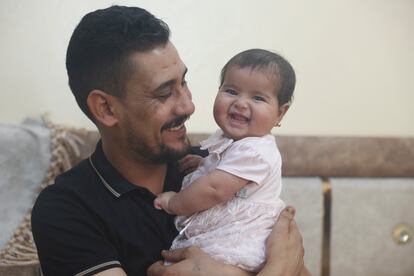Syrian baby born under earthquake rubble turns 6 months, happily surrounded by her adopted family
Afraa survived 10 hours under the rubble after the Feb. 6 earthquake crushed to death her parents and four siblings in the northern Syrian town of Jinderis

A baby girl who was born under the rubble of her family home destroyed by the deadly earthquake that hit Turkey and Syria six months ago is in good health, loves her adopted family and likes to smile even to strangers.
The dark-haired baby Afraa survived 10 hours under the rubble after the Feb. 6 earthquake crushed to death her parents and four siblings in the northern Syrian town of Jinderis. When she was found, her umbilical cord was still connected to her mother.
Her story captivated the world at the time, and people from all over offered to adopt her.
After spending days at a hospital in north Syria, Afraa was released and handed over to her paternal aunt and her husband, who adopted her and are raising her along with their five daughters and two sons. Afraa was handed over to her aunt’s family days after a DNA test was conducted to make sure the girl and her aunt are biologically related, her adopted father, Khalil al-Sawadi, said.
On Saturday, baby Afraa was enjoying herself, swinging on a red swing hanging from the ceiling while al-Sawadi pushed her back and forth.
“This girl is my daughter. She is exactly the same as my children,” said al-Sawadi, sitting cross-legged with Afraa on his lap.
Al-Sawadi said he spends the day at an apartment he rented but at night the family goes to a tent settlement to spend the night, as his children are still traumatized by the earthquake which killed more than 50,000 people in southern Turkey and northern Syria.
According to the U.N. Office for the Coordination of Humanitarian Affairs, more than 4,500 deaths and 10,400 injuries were reported in northwest Syria due to the earthquakes. It estimated that 43% of the injured are women and girls while 20% of the injured are children aged five to 14 years old.
The devastating 7.8 magnitude earthquake struck in the early hours of Feb. 6, followed by multiple aftershocks. Among the hardest hit areas was rebel-held northwestern Syria that is home to some 4.5 million people, many of whom have been displaced by the country’s 12-year conflict that has killed half a million.
When Afraa grows up, Al-Sawadi says, he will tell her the story of how she was rescued and how her parents and siblings were killed in the devastating earthquake. He said that if he doesn’t tell her, his wife or children will.
A day after the baby arrived at the hospital, officials there named her Aya — Arabic for “a sign from God.” After her aunt’s family adopted her, she was given a new name, Afraa, after her late mother.
Days after Afraa was born, her adopted mother gave birth to a daughter, Attaa. Since then she has been breast-feeding both babies, al-Sawadi said.
“Afraa drinks milk and sleeps most of the day,” al-Sawadi said.
Al-Sawadi said he has received several offers to live abroad, but he said he refused because he wants to stay in Syria, where Afraa’s parents lived and were killed.
Afraa’s biological father, Abdullah Turki Mleihan, was originally from Khsham, a village in eastern Deir el-Zour province, but left in 2014 after the Islamic State group captured the village, Saleh al-Badran, an uncle of Afraa’s father, said earlier this month.
“We are very happy with her, because she reminds us of her parents and siblings,” al-Sawadi said. “She looks very much like her father and her sister Nawara.”
Sign up for our weekly newsletter to get more English-language news coverage from EL PAÍS USA Edition
Tu suscripción se está usando en otro dispositivo
¿Quieres añadir otro usuario a tu suscripción?
Si continúas leyendo en este dispositivo, no se podrá leer en el otro.
FlechaTu suscripción se está usando en otro dispositivo y solo puedes acceder a EL PAÍS desde un dispositivo a la vez.
Si quieres compartir tu cuenta, cambia tu suscripción a la modalidad Premium, así podrás añadir otro usuario. Cada uno accederá con su propia cuenta de email, lo que os permitirá personalizar vuestra experiencia en EL PAÍS.
¿Tienes una suscripción de empresa? Accede aquí para contratar más cuentas.
En el caso de no saber quién está usando tu cuenta, te recomendamos cambiar tu contraseña aquí.
Si decides continuar compartiendo tu cuenta, este mensaje se mostrará en tu dispositivo y en el de la otra persona que está usando tu cuenta de forma indefinida, afectando a tu experiencia de lectura. Puedes consultar aquí los términos y condiciones de la suscripción digital.








































